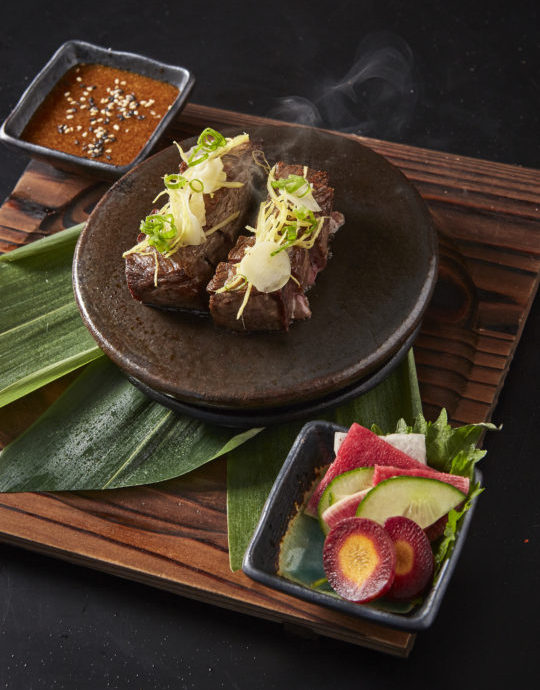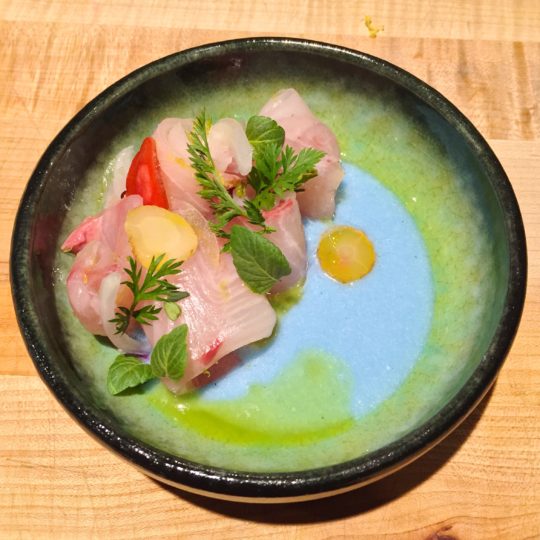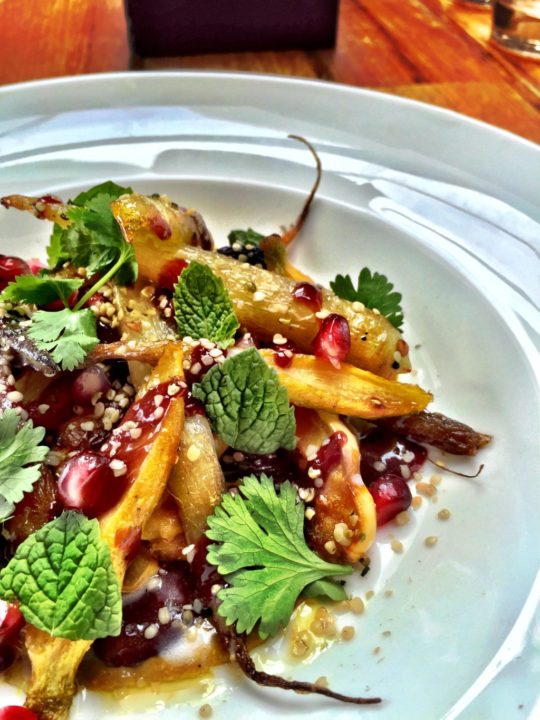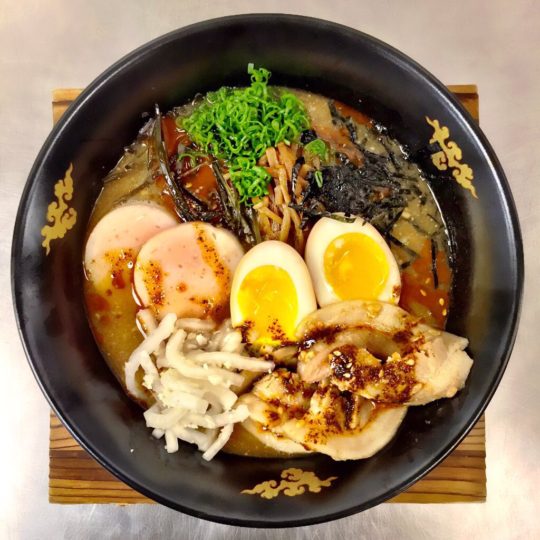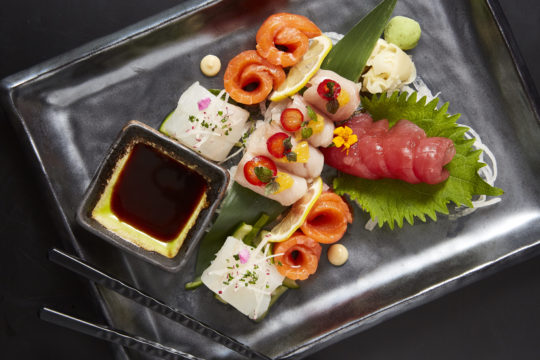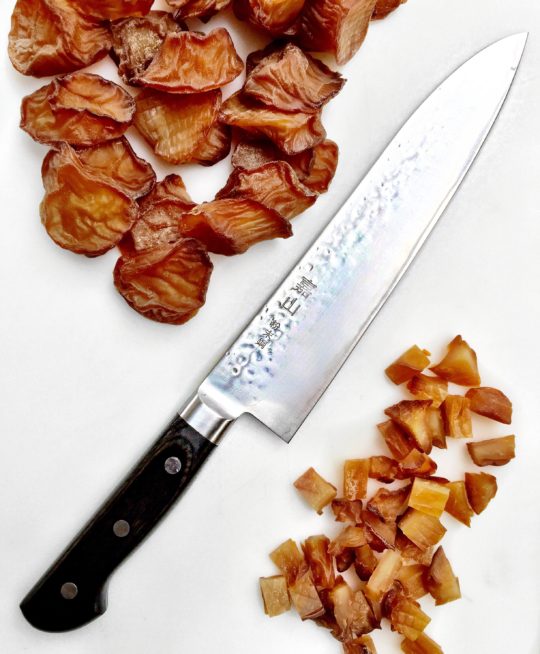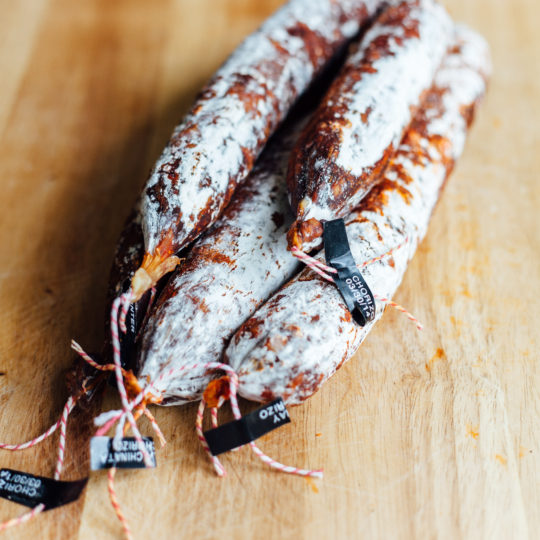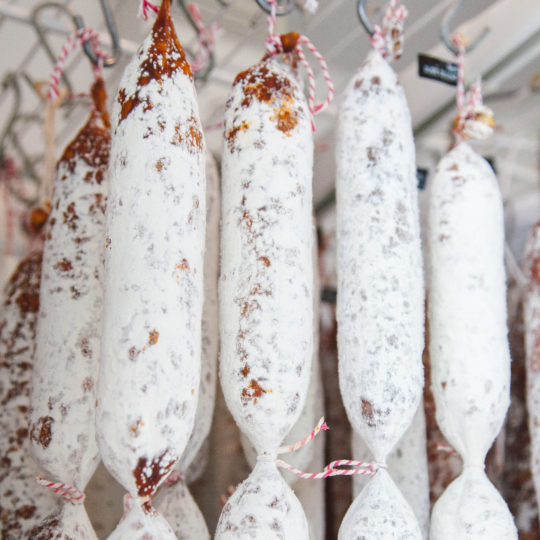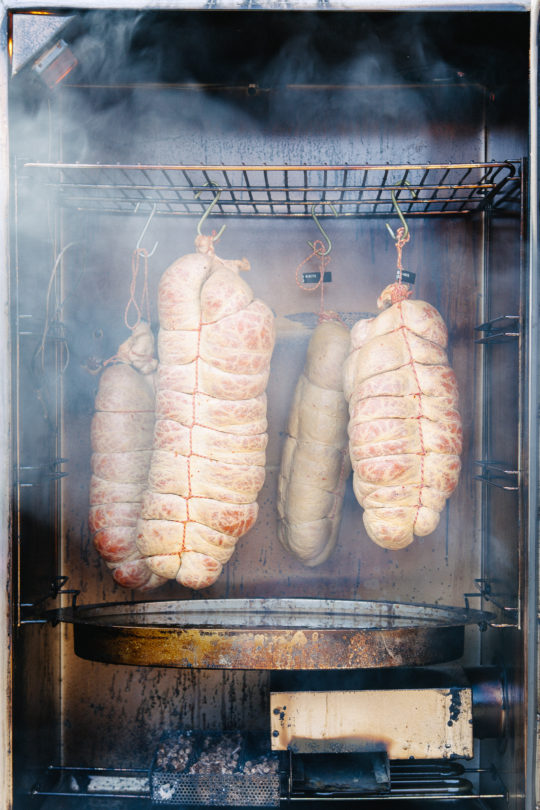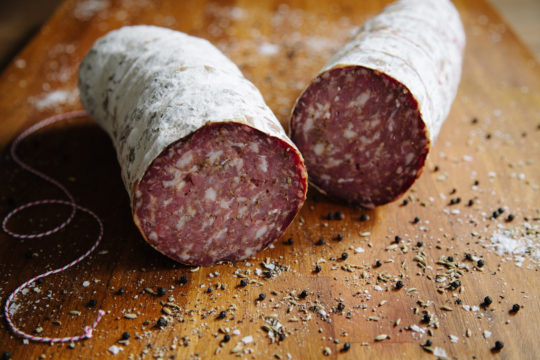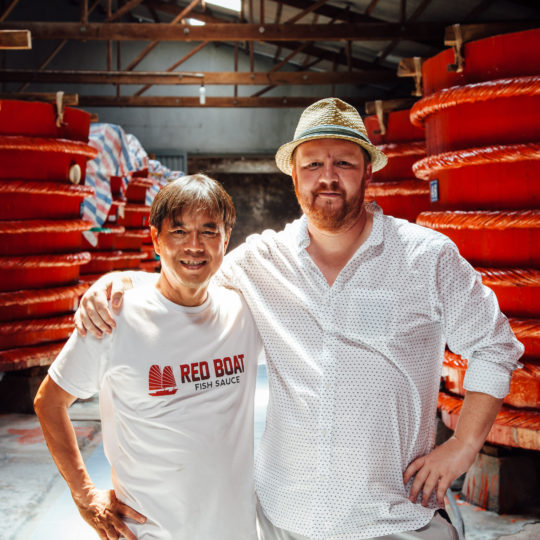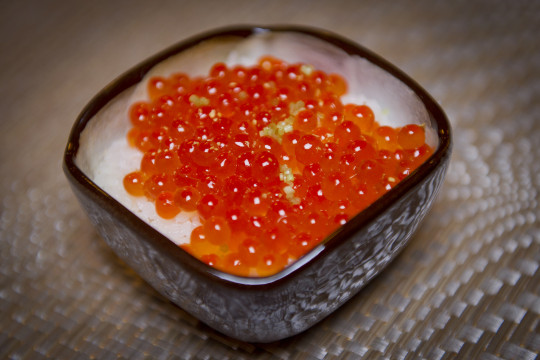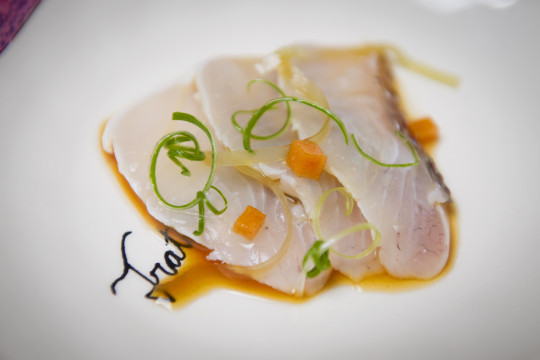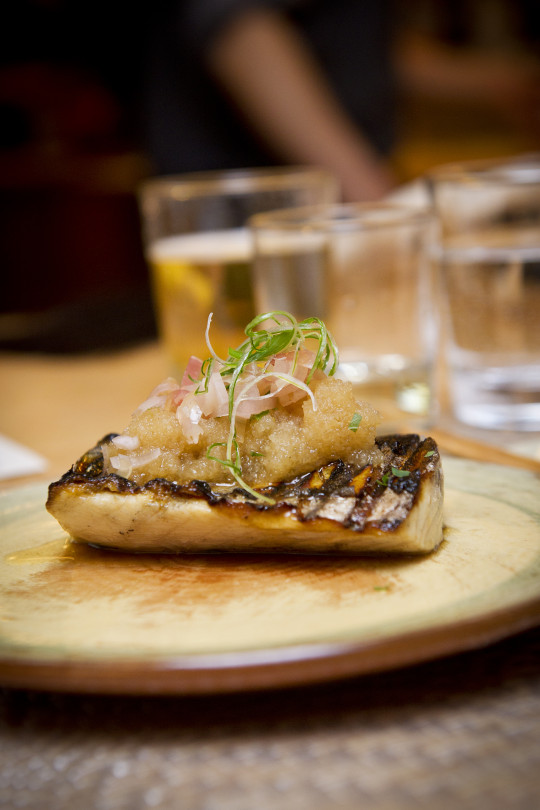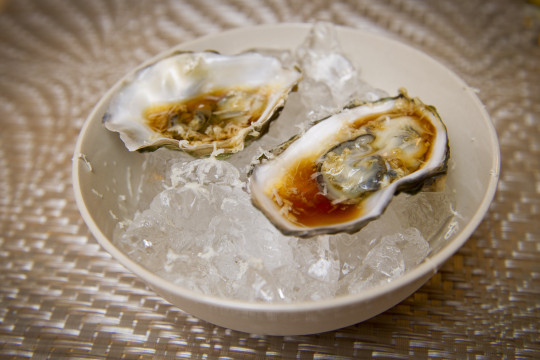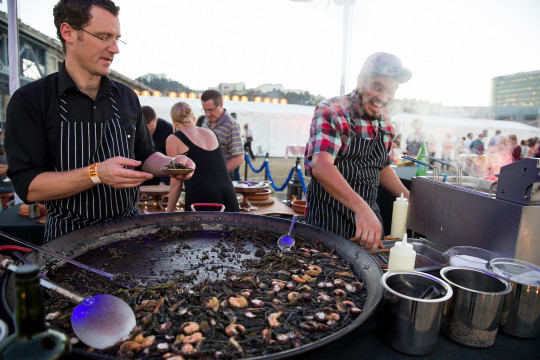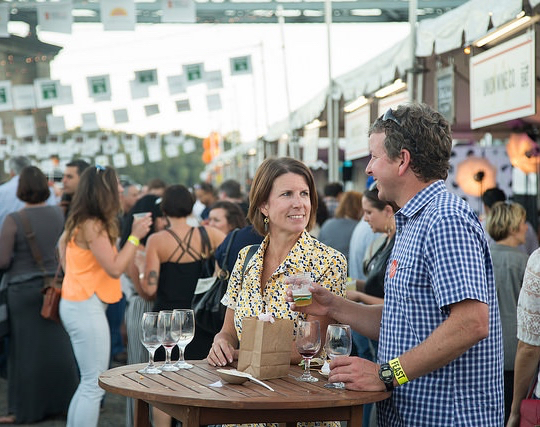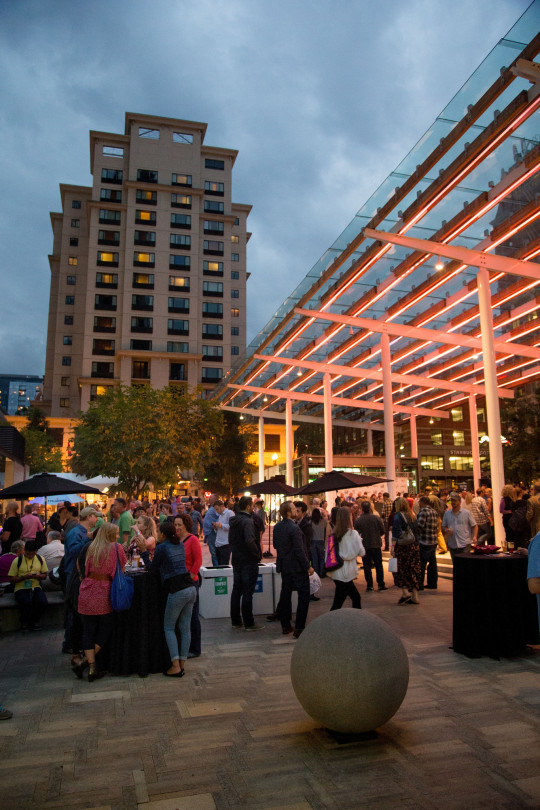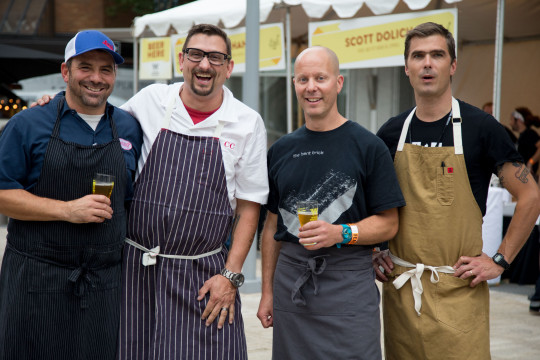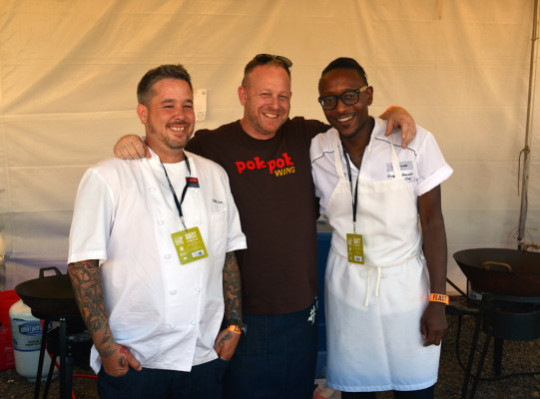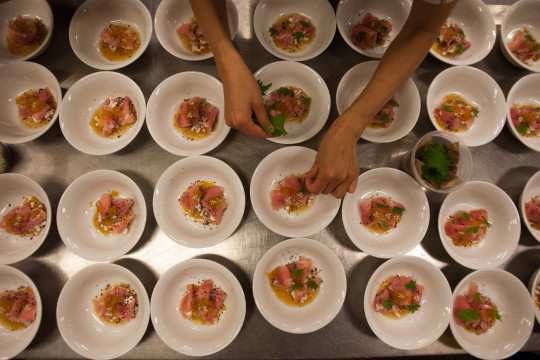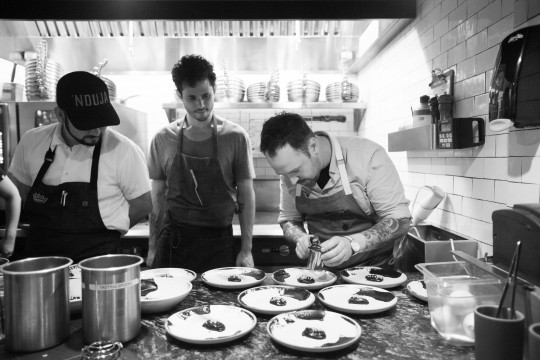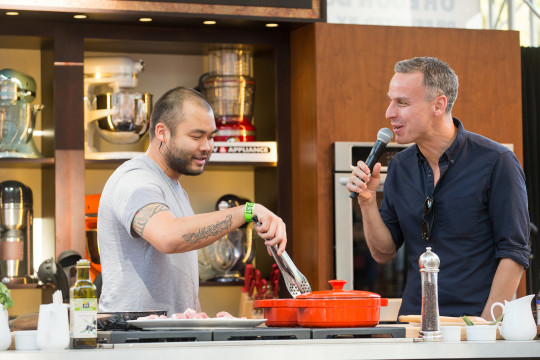Photographs courtesy of Michael Persico, Departure Restaurant and Gregory Gourdet.
Gregory Gourdet is director of culinary operations for Departure Restaurant, with outposts in Portland, OR and Denver, Colorado. A finalist on season 12 of Top Chef and former chef de cuisine for Jean-Georges Vongerichten, Gourdet’s cuisine highlights a love for asian flavors and ingredients resulting in a culinary point of view that is vibrant, seasonal and delicious.
Can you tell us a little about where you grew up and how you got interested in food?
I grew up in Queens, New York. My parents were immigrants who moved here from Haiti for a better life and to pursue education and careers in the medical world. I actually was around food often, because we were often cared for by aunts and grandparents and there was always Haitian food simmering- stews, pots of rice, always a jar of pickled chilies on the table and I always loved dessert. We always had Sunday dinners because we were raised Catholic, so it was a big thing to have dinner after mass.
I thought I wanted to be a doctor and ended up going to medical school, at NYU premed one year. After freshman year I realized that it just wasn’t the best fit for me. I was looking for something else and I wanted to get out of the city. I ended up transferring to the University of Montana where I left the city for small town living and pursued wildlife biology. That academic program too was not the best fit for me, but it was out there that I was for the first time cooking on my own. I was living on my own for the first time, renting a house, supporting and feeding myself. I had this awesome roommate who was from Long Island (New York) and we would make big dinners together and it all kind of stemmed from there. It was a small liberal arts college town and we had dinner parties and would make food for each other and hang out and it grew from really enjoying making food for lots of different people.
I got my first job washing dishes at a restaurant and at the same time cooking at a vegetable focused deli. While I was at the restaurant the chef told me I should go to culinary school. Way back then, it was before the cooking channel and reality TV and all this stuff and being a chef wasn’t as glorified and it was a little more under the radar. I started checking out culinary programs around the country and decided moving back to New York would be the best thing for me and ended up going to the CIA (Culinary Institute of America). My parents were extremely supportive as I entered my 6th year of college, they believed in me.
My first job out was through my extern at Jean-Georges, I did three months there during culinary school and when I graduated, I sought employment there. I worked for him for six and a half years. Under Jean- Georges and my mentor, his culinary director Greg Brainin I learned the fundamentals of flavor combination and techniques. Making things as clean and delicious as possible was very important to us. My first Chef De Cuisine position was with them at 66 which was a modern Chinese restaurant in Tribeca.
How did you decide to move to Oregon?
My last couple years in NYC were dark. I got super caught up in the party scene and drugs. My sense of responsibly was lost. My life became a series of long nights at clubs, after hours and even shadier after- after hours. Hard days and partying were catching up with me. Some old friends from Jean-Georges had moved to San Diego and were running a big restaurant complex there so I moved to work with them. After8 months I felt that I wasn’t in the best place for me. San Diego didn’t seem like the best fit at that time. My friend Ned Elliot, who is the chef/owner at Foreign and Domestic – was living in Portland, (Oregon) and he suggested I move to Portland. In 2007 I did.
What has your experience in Portland been like?
Portland has been absolutely amazing. I really didn’t know what to expect. I didn’t move here because I read about Portland in the NY Times, I was just looking for something different. But so many life changing things have happened in the eight years I’ve lived here. I’ve gone through a complete lifestyle change. I’ve refocused on my passion and I have found health. I am inspired daily by all the amazing things that we have here in terms of the outdoors, nature, the amazing products we get to cook with and a community who supports all this. It’s really a utopia for a chef.
We are big fans of Portland, what do you think makes the culinary scene here so special?
I think there is truly a sense that you can accomplish anything you want here. We live in a community that supports each other so much that anything is really possible. There’s a huge creative movement and we see that through all the chefs that come here and the types of cuisines represented. Because of the weather here – we have 12 months of growing season. We’re surrounded by woods, farms, vineyards and the ocean so we have a growing area for every type of thing that you could desire. The vegetables, year round fruits, and iconic region defining ingredients like berries, hazelnuts, apples and pears all growing in the pacific Northwest, Dungeness crab, salmon. We even make our own sea salt here. It’s a fantasy land for a chef.
What do you like to eat when you’re not working?
When I’m not working I am out trying to explore and see what everyone else in town is up to. I love to support my friends in the industry. A lot of use the same farms, purveyors and ingredients so it’s really fun to see what other people are doing with them. It’s fun to try to keep up and see what new things are happening here. We also have unique restaurants in the sense that there are tons of pop ups and new food carts coming up all the time and things going to brick and mortar so there is always some kind of creative outlet that we get to experience and that’s really cool. I’m an avid traveler as well. I love and pursue experiencing different culture and cuisines around the world.
How would you describe your culinary style?
The food I cook is Asian inspired, I like to reference historical and classic dishes and interpret them in a modern way, not necessarily changing things completely, but understanding the base of it and having a take on it. Also, I love to incorporate as many local ingredients as possible. We’ll take a traditional soup from Thailand, but we’ll put local Dungeness crab and local organic greens in it to make it something that speaks to where I live currently. With the bounty that we have here, of course you want to highlight it as much as possible.
Were you interested in Asian ingredients before working for Jean-Georges?
I developed my affinity for Asian cuisine working for Jean-Georges. He started his career in Asia at a very young age. He’s one of the pioneers of the fusion movement that was big in the 90s and I caught the tail end of that. We always had a lot of Asian ingredients on the menu. I was always exposed to that and those flavors caught my attention the most.
What was your experience like on Top Chef? Is there something you’d want the audience to know, that it doesn’t?
I think overall it was probably harder than it appears on TV. I think what they don’t show is a lot of times – we’re not just making a few plates for the judges. But we’re making 60, 200 plates, we are actually feeding tons and tons of real people. So it wasn’t just you have to make 6 plates and I overcooked the steak a little. You’re literally in a service for 60 people and you had 2 hours to prep and you have to serve the judges during it. Overall it was definitely one of the hardest things I’ve experienced in my life, but it was definitely rewarding, because I’m a thrill seeker and I live off adrenaline and I love challenges like that. I think overall a lot went on that we had to go through to make the show happen that doesn’t necessarily make it on TV.
Do you have any favorite ingredients you’re working with right now?
Our Portland Chef de Cuisine, Jami Flatt has been fermenting everything in sight and it has been very tasty, informative and fun. From kimchi to early fall fruits like grapes, to rice, root vegetables and sausage. My favorite combo lately is smoked, turmeric fermented daikon which one of our line cooks created actually. It is salty and sour and smoky sweet with the slight medicinal taste of the turmeric- lots of fun, funky umami.
Departure Denver recently opened. Can you tell us a little bit about how that project came together and how it will be different or similar from Departure in Portland?
We had been looking around the country for the perfect fit for our second location for about 5 years. The company I work for, Sage Restaurant Group is based in Denver so it wasn’t too soon before it was realized Denver was the fit. Many other American cities are experiencing a boom but it seems like the boom in Denver is a response to the city’s need. Lots of things are booming in Denver with a result being lots of great new restaurants. Much of what we do at Departure Portland is inspired by the markets and the ingredients we grow here. In Denver we are more focused on traditional Asian flavors and techniques. The Denver kitchen is open and we have 2 counters expanding our sushi and kushiyaki programs. The Denver location also serves brunch and lunch. They have been two fun meal periods to create. We serve pork banh mi, dim sum and coconut flour pancakes just to name a few dishes. Some of our classic dishes like bibimbap, kampachi with taro and of course the wings made their way to Denver. Departure Denver too is a highly designed space. It is inspired by taking your private jet around Asia.
What are your can’t live without kitchen tools?
For me definitely my Chubo knives!
Good Plug!
Seriously, I really don’t leave the kitchen without them. They’ve travelled with me around the world. Outside of that a couple KUNZ spoons, a mandoline – I use that a lot and a vita prep blender.
I think Sakai Takayuki Grand Chef was one of the first knives you got from us. How did you choose that series?
I think I like simple knives. I think the first time I went onto the website it was a knife that caught my attention. I was transitioning into more intricate and specific Japanese knives, I think they were shiny too. I purchased one and I loved it and it stayed sharp for a really long time. It was light and functional. It travelled well. And I committed to that series.
I think they’re amazing. But they’re not the most flashy or popular so we thought it was awesome that you were attached to them and built out your collection.
Can you give us some restaurant recommendations in Portland or elsewhere?
As the year ends, I think about my favorite meals of the past year, with my travels, nahm in Bangkok was a meal that changed a lot of things for me in terms of seeing flavor and how you can use so many different aromatics and ingredients in a single dish and where that can take you. I think in terms of technique, dining at Saison in San Francisco earlier this spring was really impressionable. To see how that kitchen runs and the care that they take, the aging and crisping and dehydrating and marinating and the amount of flavor that they’ve been able to get into perfectly cooked and thought out ingredients. That really blew me away.
Locally, Whisky Soda Lounge, the Andy Ricker bar across the street from Pok Pok (also a fav of mine), is the best for late night eats in Portland. Really amazing bold Thai flavors, super casual, open late, really flavorful unique stuff like turkey butt and clams with krachai.


